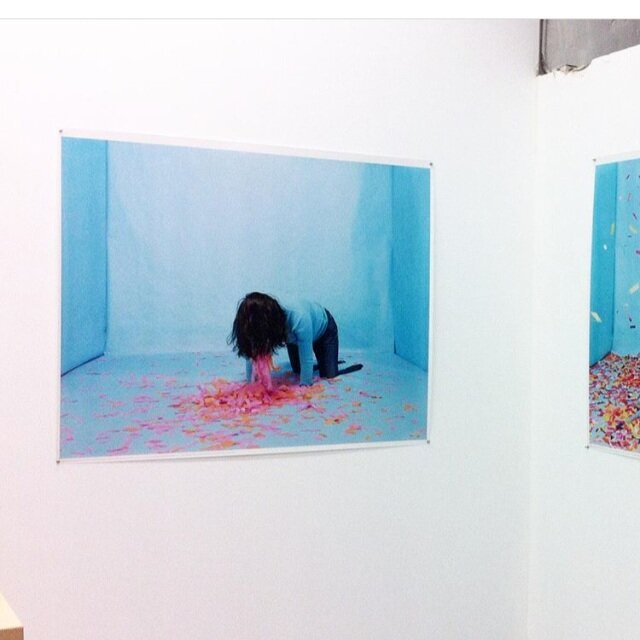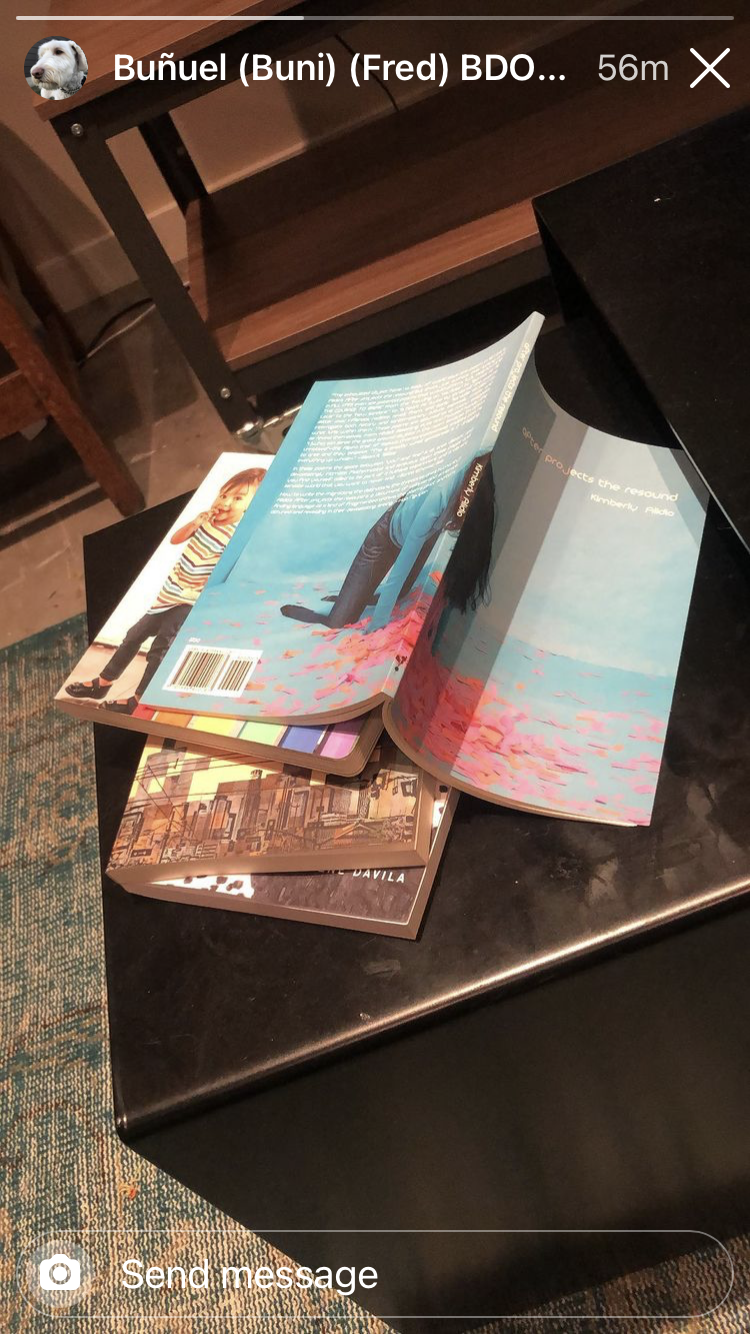Praise
"The exhausted object have no body of work," says one poem in Kimberly Alidio's AFTER PROJECTS THE RESOUND. But that's just surface. Ever lurking and in ALL CAPS even are potential poems that would affirm, “LOL AGENCY AND THE COURAGE TO SPEAK.” From the “howling on YouTube” to “Igorots at St. Louis” to the “new sardonic” to “a heart hit twice by shrapnel,” the poems skitter over, infiltrate, radiate, revolt from, and apply “karaoke studies” to interrogate both history and contemporary culture, especially cracks and what lurks within them. These poems are attuned to as many zeitgeists as reveal themselves. From Alidio's dissecting eyes and focused hands—the “I [who] can sense the space around objects in the room because I'm often unnoticed”—the Filipino trait of Kapwa (interconnectedness) enables poems to arise and they bespeak: “This is exactly what gentleness is // dragging everything up whole—.”—Eileen R. Tabios
In these poems the space between “you” and “me is at once distant and devastatingly intimate. Mathematical and sensuous. Open these pages and you find yourself called to be part of a ruthless experiment, and a vibrant sensate world that you want to never end.—Sarita Echavez See
How to write the migrations, the distinctions, the threats to one’s humanity? Alidio’s After projects the resound is a document of collapse and embrace. Finding language as a kind of fragmented archive, the poems pivot and turn, attuned and revealing in their devastating seeing. —Hoa Nguyen
Reviews
From the moment I first held it in my hands, I knew Kimberly Alidio’s debut full-length poetry collection, after projects the resound, would be magical. After reading the collection, its magnetism emerged from all parts working together to paint a picture of the legacies of colonialism. … Alidio skillfully weaves the painstakingly personal with broader strokes of shared experience, in a self-aware manner quick with both critique and gentleness. She writes, “This is exactly what gentleness is / dragging everything up whole.” This is, at its essence, Alidio’s project in after projects the resound—dragging everything up whole. She states that “mass migrations mass produce at a scale beyond the eye / any one person gets lost along the way / but a story projects domesticated edges. … after projects the resound, born of a collapse, enacts collapses of colonialism, of the notion that the world in which we live right now is somehow “post”-colonial. It disrupts the binaries of self and other, foreign and familiar, of shared and specific human experience, to give way to something else. While that something may not yet be fully formed, the pages of Alidio’s first full-length collection are brimming with a potential of longing, yearning, and acting for that new and better world. —Megan Heise, Something on Paper [pdf]
In After projects the resound, Kimberly Alidio engages in a poetics of relentlessness. Poems like “All the Pinays are straight, all the queers are Pinoy, but some of us” boast a cadence that could not feel more familiar, taking on a language of fragment and subconscious rhythm that is unmistakably current.
—Jessica Gonzalez, Galatea Resurrects [pdf]
After projects the resound is a metamorphosis, the aftermath of a dissertation-turned-monograph-turned-poetry. Alidio shows there is more than one way to produce cultural critique. The terrain of culture has the capacity to criticize, remake, celebrate, and eat itself in the most astonishing ways.
—MT Vallarta, Weird Sister [pdf]
As if from inside a small, powerful radio that transmits kaleidoscopic frequencies — linguistic, geographic, intimate, and public — these poems’ time-traveling, empire-dismantling, polyglottal, transcribed, queer, reverberating voices speak in and of “the acids of our ethnic backwash —” knowing that although “you have the watches” — “we have the time.” Alidio reclaims time from the official past, unarchiving, naming, and refracting a precise shimmering now, whose specificities include the branding of public vulnerability, a bird without feet, and the history of ketchup. Sassing back against the violent displacements of colonial power and linguistic erasure that would have their speaker "Acting a saint with saucer eyes under Sally Struthers' armpit," cutting a sharp gaze into the pit(y) of any and all such Sallys, AFTER PROJECTS THE RESOUND loudly, quietly, brilliantly LOLs at the center. When Alidio writes, "I want to jump from an endowed hall to a dinner table to a sea cliff" — I think, take me with you. —Ari Banias, Small Press Distribution [pdf]
Alidio investigates both the cultural history and the lived experience of her speakers’ queer Filipina identity through etymology, politics, and pop culture. The language of these poems carries a frenetic energy — this poetry does not aim to engage readers, it confronts us. —Heather Bowlan, Feminisms in Motion [pdf]
The structure of this book and its embedded themes are angled through Alidio's queer, Filipina perspective; while elevated through the nature of the found language of the project, her clear and independent voice—whether tackling expression of a corruptively perceived identity, longing for the presence in the everyday of intimacy, understanding intention in today's landscape of technology, or appreciating the struggle of objectification through narrative—offers an extraordinary sensibility in a world of chaos.
—Greg Bem, Rain Taxi [pdf]
Engagements + Interviews
Share more about being a writer in the intersections–how crucial is this for you, and how does that engage your audience/readership?: Gabrielle Civil sent [me a student’s essay] on how it’s [after projects the resound] primarily concerned with technology and social media. That pleased me. It was like a tarot reading. … Experimental poetics, I hope, engages our intuitive praxis and our place in the wheel of fortune. —Interview from Lambda Literary [pdf]
Tell me something about the book that may not be obvious or known: I try to avoid saying the title aloud. The first two title words trade off on acting as the subject of the phrase. So it’s both AFter PROjects [pause] the reSOUND and AFter proJECTS the reSOUND.
—Interview from Halo-Halo Review [pdf]
…loved it. —mg dufresne
I was excited, as perhaps any new discovery excites: I had not yet encountered Kimberly’s work. Once I entered the writing, however, here was an entirely different excitement. Her attention to forms and methods, their manifold possibilities, the insistent pulse of language’s rhythms and alliterative capacities, the heat of her voice moving through history, emotion, the unseen and ignored, her love of the unloved—these drew me in. I could not stop reading, I wanted to follow these lines, this voice, wherever it took me. —Marthe Reed (1959-2018), Co-publisher and managing editor of Black Radish Books, Halo-Halo Review [pdf]


























